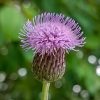I’ve noticed a very interesting headline making the rounds on Twitter the last couple days. The headline: “Glyphosate-resistant ‘superweeds’ may be less susceptible to diseases” originated with a press release from Purdue University. The article’s headline is apparently taken from a rather speculative quote by one of the co-authors of the study, Dr. Steve Hallett:
“We may be selecting not only for glyphosate resistance, but inadvertently selecting for weeds that have disease resistance as well.”
Dr. Hallet’s statement seems to be speculative, and there is really no data to support such a claim in the original article. The study was conducted by Jessica Schafer (a PhD Student), Dr. Bill Johnson and Dr. Hallet. I’ve been watching this line of research since it was first reported at the North Central Weed Science Society meetings, as my PhD work also dealt with common lambsquarters and glyphosate. The recently-accepted article by Schafer et al. describes the response of three different weed species to glyphosate when grown in sterile and unsterile soil. The results of the study are very interesting; when some weed species are grown in field soil (with all the associated soil critters) they appear to be more susceptible to glyphosate compared to weeds grown in sterilized field soil (with all the soil critters removed). This is an important finding for many of us working in weed science, because it illustrates the importance of using proper growth media when trying to confirm glyphosate resistance under greenhouse conditions. If we use sterile potting mix, our results may not be indicative of what we will see in the field.
But the headline for the press release (and all the associated twitter activity) seems to indicate that the glyphosate resistant weeds are also more resistant to disease. As I read through the article, I couldn’t really find much evidence to support the claim that glyphosate-resistant weeds are less susceptible to disease. In order to confirm this, the researchers would need to isolate the causal pathogen responsible for altering glyphosate efficacy, then re-infect the glyphosate-resistant and -susceptible biotypes to see how they respond in the absence of glyphosate. Without this type of work, there is not much evidence to support the idea that a herbicide could simultaneously select for herbicide and disease resistance. Is it possible? Sure. It is a plausible (and quite interesting) hypothesis that I’m sure the Purdue researchers are currently investigating. But there is still quite a bit of work to be done to confirm whether or not it is actually happening.
Glyphosate (like all effective herbicides) injures weeds. It is not surprising that a weed sprayed with glyphosate would be less able to fight off disease. There’s a pretty large body of research on this topic. So a plant growing without soil pathogens would be more likely to survive for a longer period of time after spraying (plants in the Schafer study were only allowed to grow 14 to 21 days after herbicide treatment; mortality was not directly measured, only plant dry weight). But the combined effect of the herbicide and pathogen would kill the plant far faster than either could alone. A weed that has evolved resistance to the herbicide would act more similar to an unsprayed plant: it could fight off disease like a healthy plant since the herbicide is not causing the desired effect. While interesting, it is not at all unexpected that herbicide resistant weeds are better able to fight disease when treated with the herbicide compared to susceptible plants. This really tells us nothing about the weed’s ability to fight disease in the absence of the herbicide.
I mean no disrespect to the authors of this study, and I’m not even being critical of the research that has been conducted. In fact, I think it was a well-done and important study, and a very interesting line of research. However, the press release headline and related tweets seem to imply far more than the research can support. I think a more appropriate headline for this press release would have been “Weeds grown in sterile soil show increased tolerance to glyphosate.” But I suppose that’s a little too boring to get many re-tweets.

